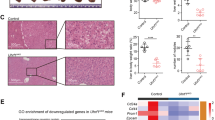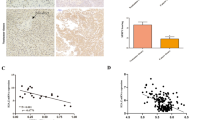Abstract
Background
Activation of the Wnt signaling pathway is frequently observed in hepatocellular carcinoma (HCC), though mutation of three of its components, CTNNB1, AXIN1, and AXIN2, is observed substantially less often.
Methods
We examined the relationship between Wnt signaling and epigenetic alteration of secreted frizzled-related protein (SFRP) genes in HCC.
Results
We frequently detected the active form of β-catenin and accumulation of nuclear β-catenin in liver cancer cell lines. We detected methylation of SFRP family genes in liver cancer cell lines (SFRP1, 9/12, 75%; SFRP2, 7/12, 58%; SFRP4, 3/12, 25%; SFRP5, 7/12, 58%) and primary HCCs (SFRP1, 9/19, 47%; SFRP2, 12/19, 63%; SFRP5, 8/19, 42%), though methylation of SFRP4 was not found in primary HCCs. SFRP methylation also was detected in hepatitis B or C virus-associated chronic hepatitis (SFRP1, 6/37, 16%; SFRP2, 14/37, 38%; SFRP5, 5/37, 14%) and liver cirrhosis (SFRP1, 10/28, 36%; SFRP2, 9/28, 32%; SFRP5, 3/28, 11%), suggesting that methylation of these genes is an early event in liver carcinogenesis. Ectopic expression of SFRPs downregulated T-cell factor/lymphocyte enhancer factor (TCF/LEF) transcriptional activity in liver cancer cells, while overexpression of a β-catenin mutant and depletion of SFRP1 using siRNA synergistically upregulated TCF/LEF transcriptional activity.
Conclusions
Our results confirm the frequent methylation and silencing of Wnt antagonist genes in HCC, and suggest that their loss of function contributes to activation of Wnt signaling during hepatocarcinogenesis.
Similar content being viewed by others
References
Cadigan KM, Nusse R. Wnt signaling: a common theme in animal development. Genes Dev 1997;11:3286–3305.
Polakis P. Wnt signaling and cancer. Genes Dev 2000;14:1837–1851.
Moon RT, Kohn AD, De Ferrari GV, Kaykas A. WNT and beta-catenin signalling: diseases and therapies. Nat Rev Genet 2004;5:691–701.
Laurent-Puig P, Zucman-Rossi J. Genetics of hepatocellular tumors. Oncogene 2006;25:3778–3786.
Ihara A, Koizumi H, Hashizume R, Uchikoshi T. Expression of epithelial cadherin and alpha-and beta-catenins in nontumoral livers and hepatocellular carcinomas. Hepatology 1996;23:1441–1447.
Huang H, Fujii H, Sankila A, Mahler-Araujo BM, Matsuda M, Cathomas G, et al. Beta-catenin mutations are frequent in human hepatocellular carcinomas associated with hepatitis C virus infection. Am J Pathol 1999;155:1795–1801.
Thompson MD, Monga SP. WNT/beta-catenin signaling in liver health and disease. Hepatology 2007;45:1298–1305.
Ikenoue T, Ijichi H, Kato N, Kanai F, Masaki T, Rengifo W, et al. Analysis of the beta-catenin/T cell factor signaling pathway in 36 gastrointestinal and liver cancer cells. Jpn J Cancer Res 2002;93:1213–1220.
Miyoshi Y, Iwao K, Nagasawa Y, Aihara T, Sasaki Y, Imaoka S, et al. Activation of the beta-catenin gene in primary hepatocellular carcinomas by somatic alterations involving exon 3. Cancer Res 1998;58:2524–2527.
de La Coste A, Romagnolo B, Billuart P, Renard CA, Buendia MA, Soubrane O, et al. Somatic mutations of the beta-catenin gene are frequent in mouse and human hepatocellular carcinomas. Proc Natl Acad Sci USA 1998;95:8847–8851.
Kondo Y, Kanai Y, Sakamoto M, Genda T, Mizokami M, Ueda R, et al. Beta-catenin accumulation and mutation of exon 3 of the beta-catenin gene in hepatocellular carcinoma. Jpn J Cancer Res 1999;90:1301–1309.
Satoh S, Daigo Y, Furukawa Y, Kato T, Miwa N, Nishiwaki T, et al. AXIN1 mutations in hepatocellular carcinomas, and growth suppression in cancer cells by virus-mediated transfer of AXIN1. Nat Genet 2000;24:245–250.
Taniguchi K, Roberts LR, Aderca IN, Dong X, Qian C, Murphy LM, et al. Mutational spectrum of beta-catenin, AXIN1, and AXIN2 in hepatocellular carcinomas and hepatoblastomas. Oncogene 2002;21:4863–4871.
Kawano Y, Kypta R. Secreted antagonists of the Wnt signalling pathway. J Cell Sci 2003;116:2627–2634.
Jones SE, Jomary C. Secreted Frizzled-related proteins: searching for relationships and patterns. Bioessays 2002;24:811–820.
Emi M, Fujiwara Y, Nakajima T, Tsuchiya E, Tsuda H, Hirohashi S, et al. Frequent loss of heterozygosity for loci on chromosome 8p in hepatocellular carcinoma, colorectal cancer, and lung cancer. Cancer Res 1992;52:5368–5372.
Chan KL, Lee JM, Guan XY, Fan ST, Ng IO. High-density allelo-typing of chromosome 8p in hepatocellular carcinoma and clinicopathologic correlation. Cancer 2002;94:3179–3185.
Kahng YS, Lee YS, Kim BK, Park WS, Lee JY, Kang CS. Loss of heterozygosity of chromosome 8p and 11p in the dysplastic nodule and hepatocellular carcinoma. J Gastroenterol Hepatol 2003;18:430–436.
Zhang LH, Qin LX, Ma ZC, Ye SL, Liu YK, Ye QH, et al. Allelic imbalance regions on chromosomes 8p, 17p and 19p related to metastasis of hepatocellular carcinoma: comparison between matched primary and metastatic lesions in 22 patients by genome-wide microsatellite analysis. J Cancer Res Clin Oncol 2003;129:279–286.
Suzuki H, Gabrielson E, Chen W, Anbazhagan R, van Engeland M, Weijenberg MP, et al. A genomic screen for genes upregulated by demethylation and histone deacetylase inhibition in human colorectal cancer. Nat Genet 2002;31:141–149.
Stoehr R, Wissmann C, Suzuki H, Knuechel R, Krieg RC, Klopocki E, et al. Deletions of chromosome 8p and loss of sFRP1 expression are progression markers of papillary bladder cancer. Lab Invest 2004;84:465–478.
Lodygin D, Epanchintsev A, Menssen A, Diebold J, Hermeking H. Functional epigenomics identifies genes frequently silenced in prostate cancer. Cancer Res 2005;65:4218–4227.
Risinger JI, Maxwell GL, Chandramouli GV, Aprelikova O, Litzi T, Umar A, et al. Gene expression profiling of microsatellite unstable and microsatellite stable endometrial cancers indicates distinct pathways of aberrant signaling. Cancer Res 2005;65:5031–5037.
Fukui T, Kondo M, Ito G, Maeda O, Sato N, Yoshioka H, et al. Transcriptional silencing of secreted frizzled related protein 1 (SFRP 1) by promoter hypermethylation in non-small-cell lung cancer. Oncogene 2005;24:6323–6327.
Veeck J, Niederacher D, An H, Klopocki E, Wiesmann F, Betz B, et al. Aberrant methylation of the Wnt antagonist SFRP1 in breast cancer is associated with unfavourable prognosis. Oncogene 2006;25:3479–3488.
Suzuki H, Watkins DN, Jair KW, Schuebel KE, Markowitz SD, Chen WD, et al. Epigenetic inactivation of SFRP genes allows constitutive WNT signaling in colorectal cancer. Nat Genet 2004;36:417–422.
Nojima M, Suzuki H, Toyota M, Watanabe Y, Maruyama R, Sasaki S, et al. Frequent epigenetic inactivation of SFRP genes and constitutive activation of Wnt signaling in gastric cancer. Oncogene 2007;26:4699–4713.
Murai M, Toyota M, Suzuki H, Satoh A, Sasaki Y, Akino K, et al. Aberrant methylation and silencing of the BNIP3 gene in colorectal and gastric cancer. Clin Cancer Res 2005;11:1021–1027.
Carruba G, Cervello M, Miceli MD, Farruggio R, Notarbartolo M, Virruso L, et al. Truncated form of beta-catenin and reduced expression of wild-type catenins feature HepG2 human liver cancer cells. Ann N Y Acad Sci 1999;886:212–216.
Iwata N, Yamamoto H, Sasaki S, Itoh F, Suzuki H, Kikuchi T, et al. Frequent hypermethylation of CpG islands and loss of expression of the 14-3-3 sigma gene in human hepatocellular carcinoma. Oncogene 2000;19:5298–5302.
Kaneto H, Sasaki S, Yamamoto H, Itoh F, Toyota M, Suzuki H, et al. Detection of hypermethylation of the p16(INK4A) gene promoter in chronic hepatitis and cirrhosis associated with hepatitis B or C virus. Gut 2001;48:372–377.
Shih YL, Hsieh CB, Lai HC, Yan MD, Hsieh TY, Chao YC, et al. SFRP1 suppressed hepatoma cells growth through Wnt canonical signaling pathway. Int J Cancer 2007;121:1028–1035.
Toyota M, Itoh F, Kikuchi T, Satoh A, Obata T, Suzuki H, et al. DNA methylation changes in gastrointestinal disease. J Gastroenterol 2002;37Suppl 14:97–101.
Sasaki Y. Does oxidative stress participate in the development of hepatocellular carcinoma? J Gastroenterol 2006;41:1135–1148.
Kato J, Miyanishi K, Kobune M, Nakamura T, Takada K, Takimoto R, et al. Long-term phlebotomy with low-iron diet therapy lowers risk of development of hepatocellular carcinoma from chronic hepatitis C. J Gastroenterol 2007;42:830–836.
He B, Lee AY, Dadfarmay S, You L, Xu Z, Reguart N, et al. Secreted frizzled-related protein 4 is silenced by hypermethylation and induces apoptosis in beta-catenin-deficient human mesothelioma cells. Cancer Res 2005;65:743–748.
Feng Han Q, Zhao W, Bentel J, Shearwood AM, Zeps N, Joseph D, et al. Expression of sFRP-4 and beta-catenin in human colorectal carcinoma. Cancer Lett 2006;231:129–137.
Author information
Authors and Affiliations
Rights and permissions
About this article
Cite this article
Takagi, H., Sasaki, S., Suzuki, H. et al. Frequent epigenetic inactivation of SFRP genes in hepatocellular carcinoma. J Gastroenterol 43, 378–389 (2008). https://doi.org/10.1007/s00535-008-2170-0
Received:
Accepted:
Published:
Issue Date:
DOI: https://doi.org/10.1007/s00535-008-2170-0




